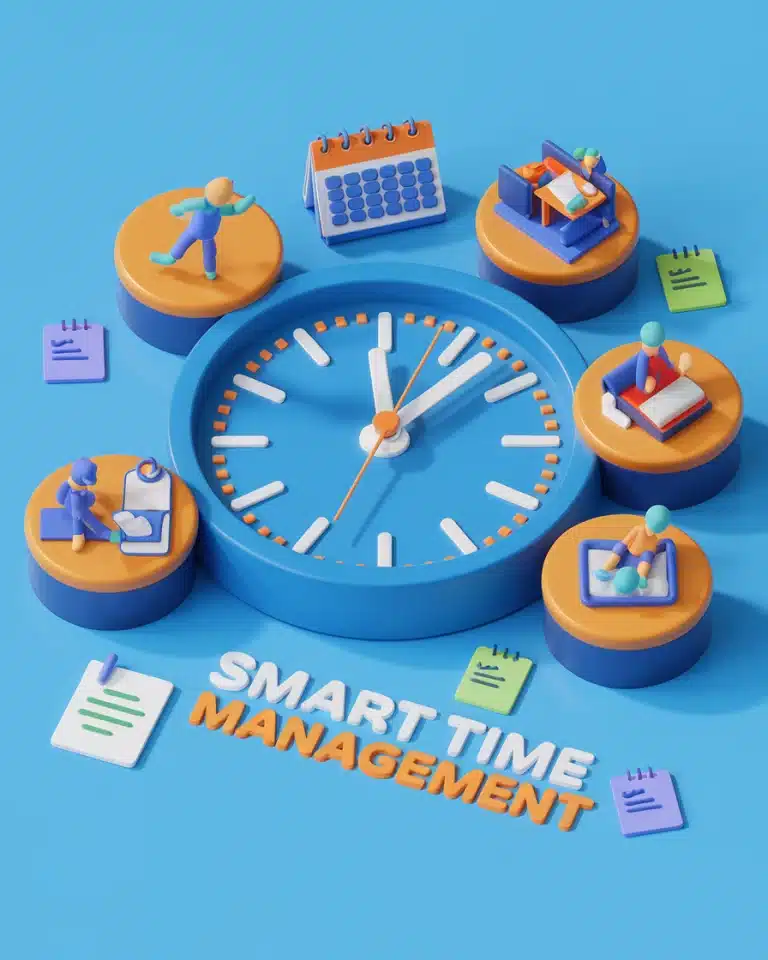Introduction:
Are you a busy bee, constantly buzzing from one task to another but never quite finishing anything? If your days are filled with flurries of activity but your productivity seems to be on vacation, it might be time to take a closer look at your time management habits. This article dives into how to transform your hectic schedule into a well-oiled machine of productivity while keeping things light and fun.
The Myth of Multitasking:
Why You’re Not a Superhero Many of us pride ourselves on our multitasking abilities, but research from The American Psychological Association suggests that multitasking can decrease productivity and increase errors. Instead of juggling multiple tasks like a circus performer, focus on one thing at a time. Embrace the power of single-tasking. Think of it as giving each task its moment to shine rather than having it compete with other tasks for attention.
The Power of the “To-Don’t” List:
Stop Doing What’s Not Helping We’ve all seen to-do lists, but what about a “to-don’t” list? This innovative approach involves listing out activities that don’t contribute to your productivity and making a conscious effort to avoid them. According to The Journal of Applied Psychology, identifying and eliminating non-essential tasks can free up valuable time and improve focus. So, if checking social media every 10 minutes isn’t helping, add it to your “to-don’t” list.
The 80/20 Rule:
Focus on What Matters The Pareto Principle or the 80/20 rule, states that 80% of your results come from 20% of your efforts. Research from Harvard Business Review highlights that identifying and focusing on the most impactful tasks can lead to greater efficiency. So, put your energy into the tasks that drive the most results and watch your productivity soar. It’s like finding the golden ticket in a sea of chocolate bars.

Time Audits:
The Detective Work of Productivity Ever wondered where your time goes? Time audits can be like detective work for your schedule. By tracking how you spend your time for a week, you can identify patterns and uncover time-wasting activities. Research from The Journal of Time Management shows that conducting a time audit can lead to significant improvements in productivity by allowing you to make informed adjustments to your schedule.
Setting Boundaries:
Why Saying “No” Can Be Your Superpower Setting boundaries is crucial for effective time management. A study published in The Journal of Organizational Behavior reveals that saying “no” to non-essential tasks and commitments can help protect your time and maintain focus. Think of it as your superpower to reclaim your schedule. Remember, it’s okay to say “no” to extra work or social events if they don’t align with your priorities.
Embracing Flexibility:
How to Adapt Without Losing Control While planning is important, flexibility is equally crucial. Research from The International Journal of Productivity and Performance Management shows that being adaptable and open to changes in your schedule can prevent burnout and increase resilience. Allow yourself some wiggle room in your plans to accommodate unexpected events and avoid the stress of rigid schedules. Flexibility is the key to managing your time effectively while staying sane.
The Joy of Scheduling Downtime:
Because You’re Not a Robot Scheduling downtime might sound counterintuitive, but it’s essential for maintaining productivity and mental well-being. A study from Psychological Science highlights that taking regular breaks and scheduling leisure activities can boost overall productivity and creativity. So, don’t forget to pencil in some relaxation and fun. After all, you’re a human, not a productivity robot.
The Importance of Reflection:
Learn, Adjust, and Grow Regular reflection on your time management practices can help you learn and grow. Research from The Journal of Behavioral Decision Making suggests that reflecting on what worked well and what didn’t can lead to better time management strategies and improved productivity. Set aside time each week to review your achievements, challenges, and areas for improvement. This reflection process will help you continuously refine your approach to managing your time.



